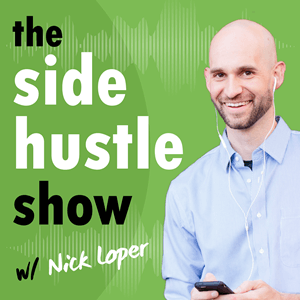
As the author of more than 70 books, Steve “S.J.” Scott is one of the most productive and disciplined people I know.
His latest title, Habit Stacking, became a Wall Street Journal Bestseller and served as the inspiration for this episode.
(Long-time listeners might remember Steve from WAY back in the archives; he was my guest in episode 9 where we discussed how to earn money as a side hustling author.)
This time though we’re diving into a few of the habits that allow Steve to continually drive his business forward, and lead a healthier and happier life. Plus, you’ll learn why we think they’re important and how you can apply them in your own life.
They’re not all directly business-related, but most take 5 minutes or less and are designed to:
increase your productivity
reduce stress
prioritize your workload
help you find a healthy work-life balance
Tune in to hear how Steve and I incorporate these habits into our daily routines (or plan to, in my case).
As you’ll see in the links section below, there are a lot of books, apps, and resources mentioned.
Factor — Get 50% off America’s #1 ready-to-eat meal delivery service w/ code sidehustle50!

Indeed – Start hiring NOW with a $75 sponsored job credit to upgrade your job post!

1. Track Your Time
Track how you spend your time working on different aspects of your business.
You can create blocks for writing, marketing, social media, research, etc., and using an app like aTimeLogger to track your time across these categories.

The goal is to review this data monthly to see where your time is actually going and make changes if needed to better allocate your precious time. For example, aim to spend 30% of your time writing and 20% on book marketing.
Give time tracking a try for the next month and see what insights it provides on where you’re actually spending (or wasting) hours each day.
Just having that self-awareness should help you become more disciplined during working sessions.
Pro tip: when your significant other wants to chat for “just a minute”…stop the timer!
2. Review Your Goals Daily
I’m definitely guilty of not setting clear annual goals in recent years. And even when I do set them, I’m terrible at reviewing them consistently.
That’s why you should review your goals daily to keep them top of mind throughout your day. While some aim to set 12-week goals (inspired by The 12 Week Year), Steve takes a more holistic, less stressful approach by focusing on key areas:
Spending time with friends and family
Writing books
Book marketing
Working on his blog
To ingrain these priorities, you can create a daily reminder that pops up every time he opens his Chrome browser.
The tool Steve uses is a simple blank page with his goals listed. I use a Chrome extension called Momentum that serves a similar purpose — it asks for my main focus each day to imprint my goals every time I open a new browser tab.

The daily goal review habit keeps your priorities front and center no matter how busy life gets.
3. Write Down ALL of Your Tasks
The goal is to document everything you do related to your business—writing, marketing, research, etc.—in an ongoing list. Steve also suggests noting things you want to do but can’t yet.
You could put this in Evernote. You could have this as a text file and have this open at all times.
Review this cumulative list weekly or monthly to find opportunities to delegate tasks that:
You hate doing
Can’t do yourself
Shouldn’t be doing
Options include hiring a VA through VirtualStaffFinder.com, freelancers, or automating through IFTTT and Zapier.
This helps you focus energy on high-impact tasks while unloading less critical items over time.
4. Fix Your “Broken Windows”
I love the analogy of “broken windows” from the Malcolm Gladwell book The Tipping Point. The idea is that visual mess and disorder in your surroundings can negatively impact your motivation and mindset.

I took a glance around my home office after he said that and realized I have toy clutter chaos everywhere!
It’s important to start your day by tidying up your immediate workspace. Something as simple as making your bed can trigger a positive mind shift to set the tone for productivity.
You want to minimize visual distractions that can divert mental bandwidth.
I find this theory applies to inbox clutter too – I’m way more stressed out when I have 100+ unread emails staring at me. But if I block out time to process and organize messages first thing in the morning, I feel calmer and more focused.
5. Wear a Step Tracking Device
I’ve seen friends and family members get obsessed with their Fitbits and step counts over the years. But Steve presented a compelling productivity angle that I haven’t considered before.
He uses step counts almost like a Pavlovian trigger to remind himself to take regular movement breaks. His Fitbit Charge 2 buzzes every hour, prompting him to get up and walk around for a few minutes.

Just a quick lap around the house or office lets your mind recharge a bit.
And apparently, if you do this every hour for a 10-hour workday, you easily accumulate 2,500+ daily steps without any other exercise.
I love this because I often find myself glued in place for much too long while editing podcast episodes. Now my goal is to implement this hourly step countdown to enforce breaks and mental resets.
The key is finding small ways to regularly move your body, which pays significant rewards in energy, health, and wellbeing over time.
6. Keep a Food Diary
I don’t think I’ve ever consciously tracked what I eat on a daily basis.
While I generally try to maintain healthy eating habits, Steve raised an interesting point about accountability, which is to keep a food diary using an app like MyFitnessPal.

Writing down everything you eat brings two main benefits:
Accountability and honesty about the calories you’re actually eating
Subconscious discouragement from making less healthy choices (when you know you’ll have to document them later!)
The idea here is “what gets measured gets managed.” So when you know how much you’re putting your body, you can start to make small choices to improve your health.
Now when you’re grabbing that second chocolate chip cookie, there’s a mental speed bump in place. Because you know you’ll have to document it later in your food diary! Over time this heightened consciousness can nudge you toward better decisions.
Give keeping a food diary a try if your current approach to diet isn’t yielding the results you desire. And leverage the data to consciously improve!
7. Research One Side Hustle
As the host of The Side Hustle Show, I believe learning about new income ideas can spark creativity and inspiration.
Choose one potential hustle to research for 5-10 minutes each day. I love this incremental approach as an “elephant habit” strategy.
You can explore opportunities from resources such as my book, Buy Buttons: The Fast-Track Strategy to Make Extra Money and Start a Business in Your Spare Time.
You can also maintain a spreadsheet tracking the required time, costs, equipment, and personality fit for ideas that intrigue you.
Critical questions to ask yourself for each prospect include:
Do I have time for this?
What equipment is needed?
How much money do I need to invest upfront?
Does this match my personality and skills?
The goal is to find ONE promising match to begin testing and see if it can scale rather than jumping from idea to idea. Use a tool like the pro calculator at ListenMoneyMatters.com to evaluate financial viability.
The goal here is to identity options aligned with your skills and interests. But don’t let analysis paralysis set in!
Once an idea seems viable and exciting, take action to get it off the ground even before you feel “ready.” You’ll learn the most by doing, and course correct as needed based on real-world customer feedback.
8. Break Down a Big Project into Manageable Steps
The eighth habit draws from David Allen’s Getting Things Done approach of breaking big projects down into specific next step actions.
Whenever you’re faced with something with multiple steps, you want to break it down into a single action that you can do in just one day.
You can use apps like Todoist to manage extensive writing pipeline, with 70+ granular steps assigned to each book project. This transforms an intimidating goal like “write book” into small, daily progress.
For example, if you’re planning to redesign your website, you could include:
Identify a theme
Get some new pictures taken
Hire somebody to modify it
The key is to “identify the next actionable step.” Map out the full roadmap upfront into concrete checkpoints then tackle each piece along the way.
9. Follow an Evening Shutdown Routine
Establish an evening shutdown routine to create better work-life balance as an entrepreneur. Without definitive signals, it’s easy to endlessly work nights and weekends without enjoyment.
You can do a 5 to 10 minute practice at the end of each day, inspired by Cal Newport’s book, Deep Work:
Review tomorrow’s calendar
Make sure no critical tasks were missed
Identify the 1-3 most important tasks for tomorrow
Fully power down computer
Plug phone into charger across the room
Focus on family time/hobbies
Creating space for non-work activities and truly being present with loved ones requires the discipline to “turn off” each evening. Give it a try to prevent burnout!
10. Deep Breathing / Meditation / Progressive Relaxation
Deep Breathing – As John Lee Dumas has noted in Ep 436, taking slow breaths deep into your belly is tremendously relaxing. Make time to focus on your breath.
Meditation – A regular meditation practice clears mental clutter. Start small with 5-10 minutes daily.
Progressive Relaxation – Based on the technique from the book Declutter Your Mind, systematically tense and release muscle groups across your entire body to melt away tension.
Pick one or two of these that appeal and make time to build the ritual. You may also find benefit in layering all three into an evening routine.
The goal is simply to infuse more mindfulness into daily life—to be fully present despite chaos and keep perspective on what truly matters. Small habits can yield huge changes over time.
Steve’s #1 Tip for Side Hustle Nation
“Identify your 80/20. Figure out what’s actually driving the results and focus on that first thing every morning.”
Your Turn
I hope you enjoyed exploring these 10 foundational habits. Even implementing one or two of these practices can pay huge rewards over time.
Start small and be consistent above all. Track your progress to stay motivated and build momentum. And let me know which habits resonate most with you or what’s working in your own routine!
Links:
Looking for More Side Hustle Help?









